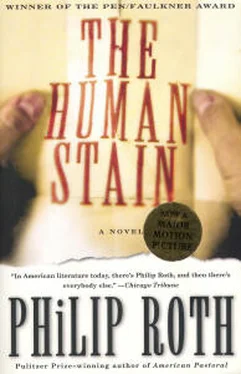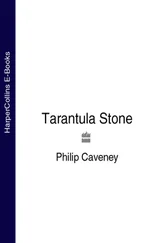He had prepared himself. The important thing was to forget about Iris's hair and let her speak, let her find her fluency and, from the soft streaming of her own words, create for him his apologia.
“You're never going to let them see me,” she said. “You're never going to let them know who I am. ‘Mom,’ you'll tell me, 'Ma, you come to the railroad station in New York, and you sit on the bench in the waiting room, and at eleven twenty-five A.M., I'll walk by with my kids in their Sunday best.' That'll be my birthday present five years from now. 'Sit there, Mom, say nothing, and I'll just walk them slowly by' And you know very well that I will be there. The railroad station. The zoo. Central Park. Wherever you say, of course I'll do it. You tell me the only way I can ever touch my grandchildren is for you to hire me to come over as Mrs. Brown to baby-sit and put them to bed, I'll do it. Tell me to come over as Mrs. Brown to clean your house, I'll do that. Sure I'll do what you tell me. I have no choice.”
“Don't you?”
“A choice? Yes? What is my choice, Coleman?”
“To disown me.”
Almost mockingly, she pretended to give that idea some thought. “I suppose I could be that ruthless with you. Yes, that's possible, I suppose. But where do you think I'm going to find the strength to be that ruthless with myself?”
It was not a moment for him to be recalling his childhood. It was not a moment for him to be admiring her lucidity or her sarcasm or her courage. It was not a moment to allow himself to be subjugated by the all-but-pathological phenomenon of mother love. It was not a moment for him to be hearing all the words that she was not saying but that were sounded more tellingly even than what she did say. It was not a moment to think thoughts other than the thoughts he'd come armed with. It was certainly not a moment to resort to explanations, to start brilliantly toting up the advantages and the disadvantages and pretend that this was no more than a logical decision. There was no explanation that could begin to address the outrage of what he was doing to her. It was a moment to deepen his focus on what he was there to achieve. If disowning him was a choice foreclosed to her, then taking the blow was all she could do. Speak quietly, say little, forget Iris's hair, and, for however long is required, let her continue to employ her words to absorb into her being the brutality of the most brutal thing he had ever done.
He was murdering her. You don't have to murder your father. The world will do that for you. There are plenty of forces out to get your father. The world will take care of him, as it had indeed taken care of Mr. Silk. Who there is to murder is the mother, and that's what he saw he was doing to her, the boy who'd been loved as he'd been loved by this woman. Murdering her on behalf of his exhilarating notion of freedom! It would have been much easier without her. But only through this test can he be the man he has chosen to be, unalterably separated from what he was handed at birth, free to struggle at being free like any human being would wish to be free. To get that from life, the alternate destiny, on one's own terms, he must do what must be done. Don't most people want to walk out of the fucking lives they've been handed? But they don't, and that's what makes them them, and this was what was making him him. Throw the punch, do the damage, and forever lock the door. You can't do this to a wonderful mother who loves you unconditionally and has made you happy, you can't inflict this pain and then think you can go back on it. It's so awful that all you can do is live with it. Once you've done a thing like this, you have done so much violence it can never be undone — which is what Coleman wants. It's like that moment at West Point when the guy was going down. Only the referee could save him from what Coleman had it in him to do. Then as now, he was experiencing the power of it as a fighter. Because that is the test too, to give the brutality of the repudiation its real, unpardonable human meaning, to confront with all the realism and clarity possible the moment when your fate intersects with something enormous. This is his. This man and his mother. This woman and her beloved son. If, in the service of honing himself, he is out to do the hardest thing imaginable, this is it, short of stabbing her. This takes him right to the heart of the matter. This is the major act of his life, and vividly, consciously, he feels its immensity.
“I don't know why I'm not better prepared for this, Coleman. I should be,” she said. “You've been giving fair warning almost from the day you got here. You were seriously disinclined even to take the breast. Yes, you were. Now I see why. Even that might delay your escape. There was always something about our family, and I don't mean color — there was something about us that impeded you. You think like a prisoner. You do, Coleman Brutus. You're white as snow and you think like a slave.”
It was not a moment to give credence to her intelligence, to take even the most appealing turn of phrase as the embodiment of some special wisdom. It often happened that his mother could say something that made it sound as though she knew more than she did. The rational other side. That was what came of leaving the orating to his father and so seeming by comparison to say what counted.
“Now, I could tell you that there is no escape, that all your attempts to escape will only lead you back to where you began. That's what your father would tell you. And there'd be something in Julius Caesar to back him up. But for a young man like you, whom everybody falls for? A good-looking, charming, clever young fellow with your physique, your determination, your shrewdness, with all your wonderful gifts? You with your green eyes and your long dark lashes? Why, this should cause you no trouble at all. I expect coming to see me is about as hard as it's going to get, and look how calmly you're sitting here. And that is because you know what you're doing makes great sense. I know it makes sense, because you would not pursue a goal that didn't. Of course you will have disappointments. Of course little is going to turn out as you imagine it, sitting so calmly across from me. Your special destiny will be special all right — but how? Twenty-six years old — you can't begin to know. But wouldn't the same be true if you did nothing? I suppose any profound change in life involves saying 'I don't know you' to someone.”
She went on for nearly two hours, a long speech about his autonomy dating back to infancy, expertly taking in the pain by delineating all she was up against and couldn't hope to oppose and would have to endure, during which Coleman did all he could not to notice — in the simplest things, like the thinning of her hair (his mother's hair, not Iris's hair) and the jutting of her head, the swelling of her ankles, the bloating of her belly, the exaggerated splay of her large teeth — how much further along toward her death she'd been drawn since the Sunday three years back when she'd done everything gracious she could to put Steena at her ease. At some point midway through the afternoon, she seemed to Coleman to step up to the very edge of the big change: the point of turning, as the elderly do, into a tiny, misshapen being. The longer she talked, the more he believed he was seeing this happen. He tried not to think about the disease that would kill her, about the funeral they would give her, about the tributes that would be read and the prayers offered up at the side of her grave. But then he tried not to think about her going on living either, of his leaving and her being here and alive, the years passing and her thinking about him and his children and his wife, more years passing and the connection between the two of them only growing stronger for her because of its denial.
Читать дальше












